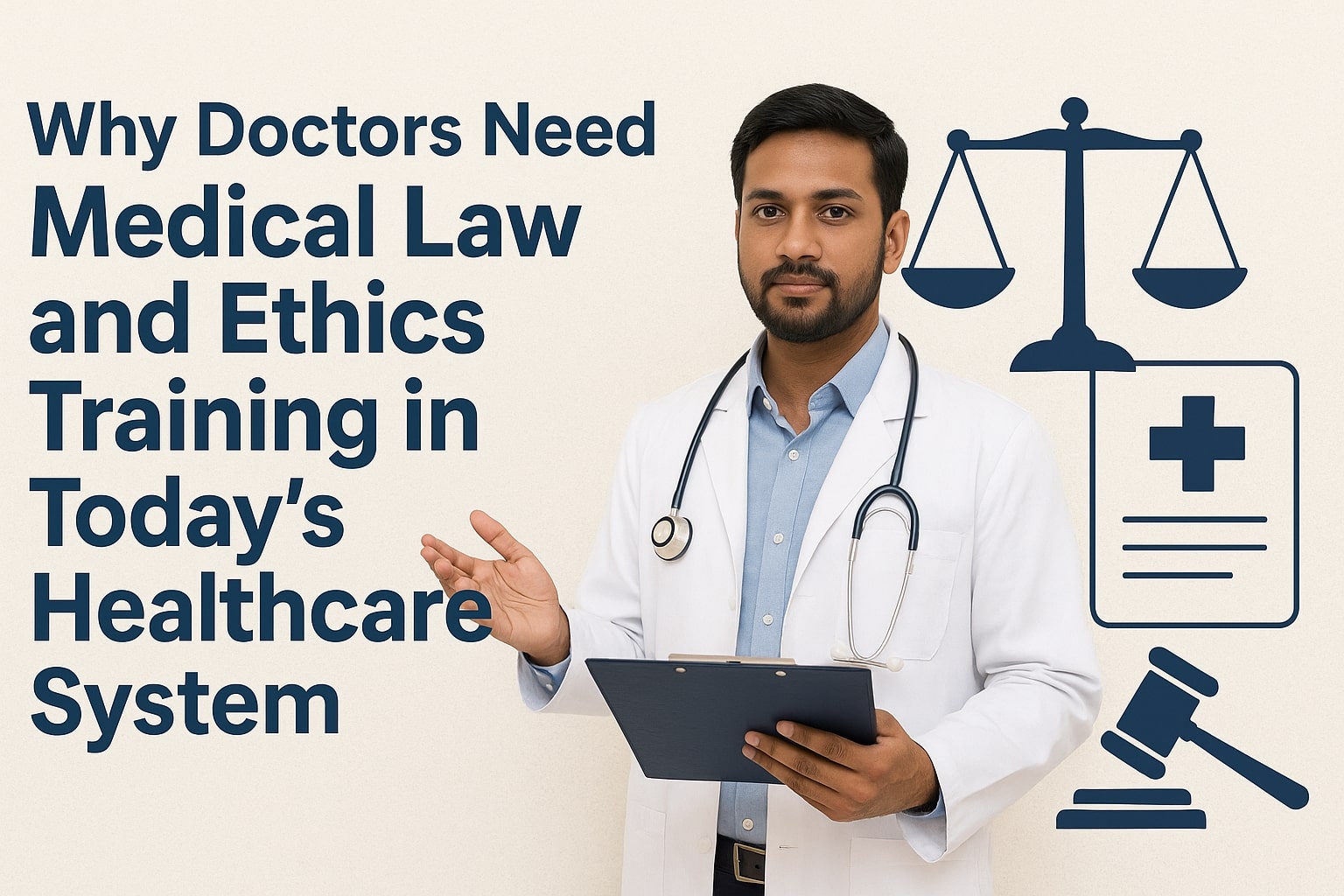Introduction
India’s healthcare ecosystem is evolving rapidly, with advancements in technology, growing patient awareness, and stricter legal frameworks. Alongside these changes, doctors today face increasing medico-legal challenges. From patient complaints to legal disputes, the risks of practicing medicine without legal and ethical knowledge are higher than ever. This makes medical law and ethics training for doctors an essential part of modern medical practice.
Understanding Medical Law and Ethics in Healthcare
Medical law defines the legal obligations doctors must follow, while ethics focuses on moral principles that guide their professional conduct. Together, they form the backbone of safe, transparent, and patient-centered care.
- Legal obligations: Maintaining accurate records, informed consent, and compliance with statutory guidelines.
- Ethical responsibilities: Respecting confidentiality, ensuring fairness, and prioritizing patient well-being.
Doctors need both legal awareness and ethical sensitivity to practice responsibly in today’s healthcare environment.
Importance of Medical Law for Doctors
The importance of medical law for doctors cannot be overstated. A single instance of negligence or miscommunication can lead to lawsuits, professional penalties, and reputational damage. For instance:
- A delay in providing consent forms may result in allegations of malpractice.
- Inaccurate billing can trigger legal complaints under the Consumer Protection Act 2019.
Doctors who understand their legal duties can minimize risks and focus more confidently on patient care.
Why Ethics Training is Crucial in Modern Healthcare
Beyond legal compliance, ethics plays a vital role in patient trust and clinical credibility. Ethical training helps doctors:
- Navigate sensitive issues like patient confidentiality and data privacy.
- Handle end-of-life care decisions with compassion.
- Make fair and transparent choices when faced with clinical dilemmas.
Ethics training also enhances communication skills, which directly improves patient satisfaction and outcomes.
Benefits of Medical Law Courses for Doctors
The benefits of medical law courses for doctors go far beyond compliance. Structured training provides:
- Better decision-making: Doctors learn how to balance medical judgment with legal considerations.
- Risk management: Awareness reduces the likelihood of medico-legal disputes.
- Career growth: Certified knowledge in medical law enhances a doctor’s professional reputation.
Ultimately, such courses empower doctors to provide safe and ethical care while protecting themselves from unnecessary legal complications. If you’re looking to strengthen your medico-legal knowledge, explore our Master Indian Medical Law course designed specifically for healthcare professionals.
Legal Awareness for Healthcare Professionals
Legal awareness for healthcare professionals is crucial in today’s healthcare environment. Every doctor should know key laws such as:
- Consumer Protection Act (CPA 2019), which covers patient rights and medical liability.
- Medical Council of India (MCI) guidelines for ethical practice.
- Clinical Establishments Act, which governs hospital operations.
Since laws evolve, continuous updates and refresher training ensure doctors remain compliant and confident in their practice.
How Medipreneur Training Bridges the Gap
Structured training programs bridge the gap between medical expertise and legal requirements. With expert faculty who specialize in both medicine and law, such programs focus on:
- Real-world case studies of medico-legal disputes.
- Practical modules on conflict resolution and ADR (Alternative Dispute Resolution).
- Certifications that enhance credibility in India and abroad.
This practical approach ensures that doctors not only learn the theory but also know how to apply it in daily practice.
Future of Healthcare Without Legal and Ethical Training
Ignoring medico-legal education carries serious risks:
- Rising lawsuits against doctors and hospitals.
- Heavy penalties that strain financial and professional stability.
- Patient mistrust leading to reputational loss.
Globally, medico-legal training is becoming standard. For Indian doctors to stay competitive and secure, structured legal and ethical education is no longer optional—it’s a necessity.
Conclusion
The need for medical law and ethics training for doctors has never been more urgent. By understanding the importance of medical law for doctors, embracing ethics training, and exploring the benefits of medical law courses for doctors, healthcare professionals can protect themselves, serve patients better, and build lasting trust.
👉 Ready to enhance your medical career with the right legal and ethical knowledge?
Contact us today to learn more about our specialized medical law and ethics training programs.








